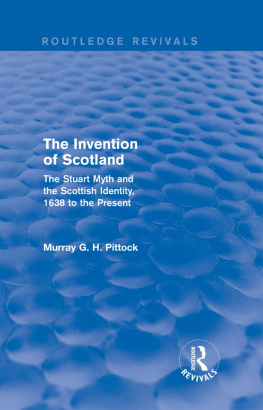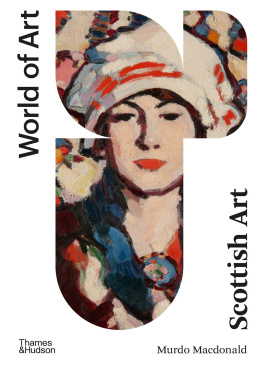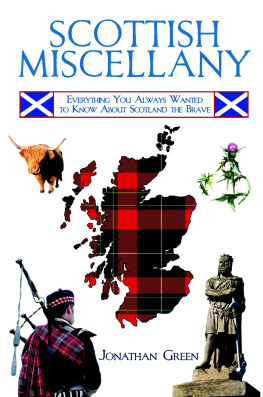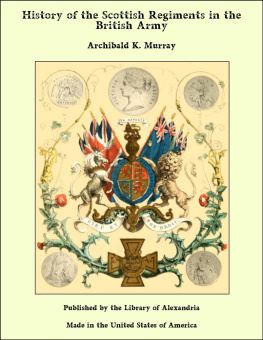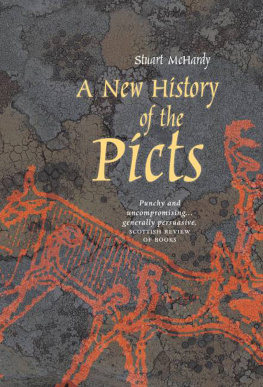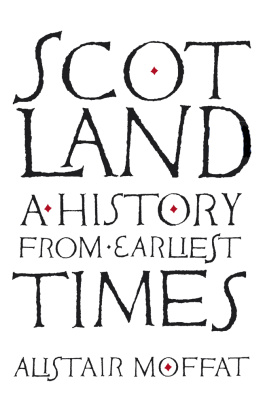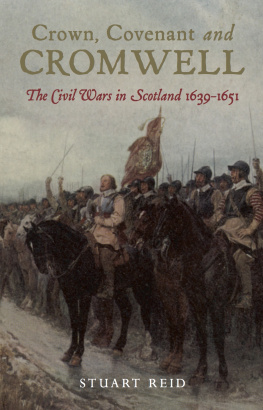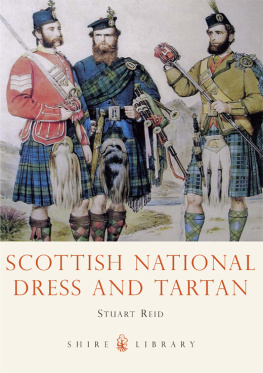Routledge Revivals
The Invention of Scotland
A dynasty of high ability and great charm, the Stuarts exerted a compelling fascination over their supporters and enemies alike. First published in 1991, this title assesses the influence of the Stuart mystique on the modern political and cultural identity of Scotland. Murray Pittock traces the Stuart myth from the days of Charles I to the modern Scottish National Party, and discusses both pro- and anti-Union propaganda. He provides a unique insight into the radicalism of Scottish Jacobitism, contrasting this Jacobitisim of the Left with the sentimental image constructed by the Victorians. Dealing with a subject of great relevance to modern British society, this reissue provides an extensive analysis of Scottish nationhood, the Stuart cult and Jacobite ideology. It will be of great interest to students of literature, history, and Scottish culture and politics.
The Invention of Scotland
The Stuart Myth and the Scottish Identity, 1638 to the Present
Murray G. H. Pittock
First published in 1991
by Routledge
This edition first published in 2015 by Routledge
2 Park Square, Milton Park, Abingdon, Oxon, OX14 4RN
and by Routledge
711 Third Avenue, New York, NY 10017
Routledge is an imprint of the Taylor & Francis Group, an informa business
1991 Murray G. H. Pittock
The right of Murray G. H. Pittock to be identified as author of this work has been asserted by him in accordance with sections 77 and 78 of the Copyright, Designs and Patents Act 1988.
All rights reserved. No part of this book may be reprinted or reproduced or utilised in any form or by any electronic, mechanical, or other means, now known or hereafter invented, including photocopying and recording, or in any information storage or retrieval system, without permission in writing from the publishers.
Publishers Note
The publisher has gone to great lengths to ensure the quality of this reprint but points out that some imperfections in the original copies may be apparent.
Disclaimer
The publisher has made every effort to trace copyright holders and welcomes correspondence from those they have been unable to contact.
A Library of Congress record exists under LC control number: 90024511
ISBN 13: 978-1-138-81315-1 (hbk)
ISBN 13: 978-1-315-74826-9 (ebk)
THE INVENTION OF SCOTLAND
The Stuart myth and the Scottish identity, 1638 to the present
Murray G. H. Pittock
First published in 1991
by Routledge
11 New Fetter Lane, London EC4P 4EE
Simultaneously published in the USA and Canada
by Routledge
a division of Routledge, Chapman and Hall Inc.
20 West 35th Street, New York, NY 10001
1991 Murray G. H. Pittock
Typeset in Linotron Garamond by
Falcon Typographic Art Ltd, Edinburgh & London
Printed in Great Britain by
T. J. Press (Padstow) Ltd, Padstow, Cornwall
All rights reserved. No part of this book may be reprinted or reproduced or utilized in any form or by any electronic, mechanical, or other means, now known or hereafter invented, including photocopying and recording, or in any information storage or retrieval system, without permission in writing from the publishers.
British Library Cataloguing in Publication Data
Pittock, Murray
The invention of Scotland: the Stuart myth and the Scottish identity, 1638 to the present.
1. Scotland. Nationalism, history
I. Title
320.5409411
Library of Congress Cataloging in Publication Data
Pittock, Murray
The invention of Scotland: the Stuart myth and the Scottish identity, 1638 to the present by Murray G. H. Pittock.
p. cm.
Includes bibliographical references and index.
1. Stuart, House of. 2. Scotland Historiography. 3. Scotland Kings and rulers. 4. Nationalism Scotland History. 5. National characteristics, Scottish. I. Title.
DA758.3.S8P58 1991
941.1dc2090-24511
ISBN 0-415-05586-5
To Ross
Contents
Hie jacet Arthurus, Rex quondam rexque futurus.
Surpassing the story even of Arthur and the Knights of the Round Table, because more near, more real and historical, the romance of Prince Charlie and the Highland chiefs has taken a lasting hold of the popular imagination.
Magnus Maclean, The Literature of the Celts
My thanks are due to many and to one. In particular, I owe thanks to Colin MacLaren for my free access to the MacBean Collection in Aberdeen University Library; to the staff of the National Library of Scotland, and to the British Academy whose research awards made research both possible and expeditious. My debts are due to the arguments of Frank McLynn, Paul Monod, and Willie Donaldson, who hitherto have made the closest approaches to the arguments enlarged upon here.
For permission to quote copyright material, I am indebted to Martin Brian & OKeefe Ltd, the original publishers of the poems quoted from the Completed Poems of Hugh MacDiarmid 19201976, ed. Michael Grieve and W. R. Aitken (Penguin Books, 1978) and to Michael Grieve. Carcanet Press kindly gave permission to quote from Iain Crichton Smiths The Exiles (1984).
If these many made it possible to write the book, so did one, my wife Anne, who gave the time and peace to write it.
Ancient traditions, when tested by the severe process of modern investigation, commonly enough fade away into mere dreams, but it is singular how often the dream turns out to have been a half-awake one, presaging reality.
T. H. Huxley
A people who lose their nationality create a legend to take its place.
Edwin Muir
Their lost realm has become our common heritage; and on the verge of despair we may find inspiration and comfort in the deep-seated conviction that sometime, somewhere, there will be a king over the water to save the day if only we remain faithful to the noble dream of that lost dynasty which will live for ever in our hearts.
Pierre Joannon, writing in the Royal Stuart Review, 1988
This is a book about the Stuart myth and its continuing power. It is not about tartan, whisky, or biscuit-tin depiction of the Stuarts, though these uses and abuses of the dynastys image will be discussed. Rather it is about the unique fascination exerted by the Stuarts in their day and our own, and the contribution their propaganda, ideology, origin, and character has made to understanding the Scottish identity. Indeed, to enable that identity to understand itself the Stuart myth is one of the prime means of definition.
The British Isles are well-endowed with heroic legendary rulers, from Arthur to Cuchulainn to Fionn. It is said of many of these that they will return to lead their countries to victory at the time when they are most needed. Indeed, in the last hundred years, Irish nationalism has used such figures in support of its own claims. The statue of Cuchulainn in the GPO in Dublin bears witness to Patrick Pearses supposed appeal to his spirit at the crisis of the 1916 Rising. Welsh nationalism makes use of the same kind of images, as the folk-song about Owain Glyndwr the Welsh hero makes clear:
Owain is again ready for the day.

